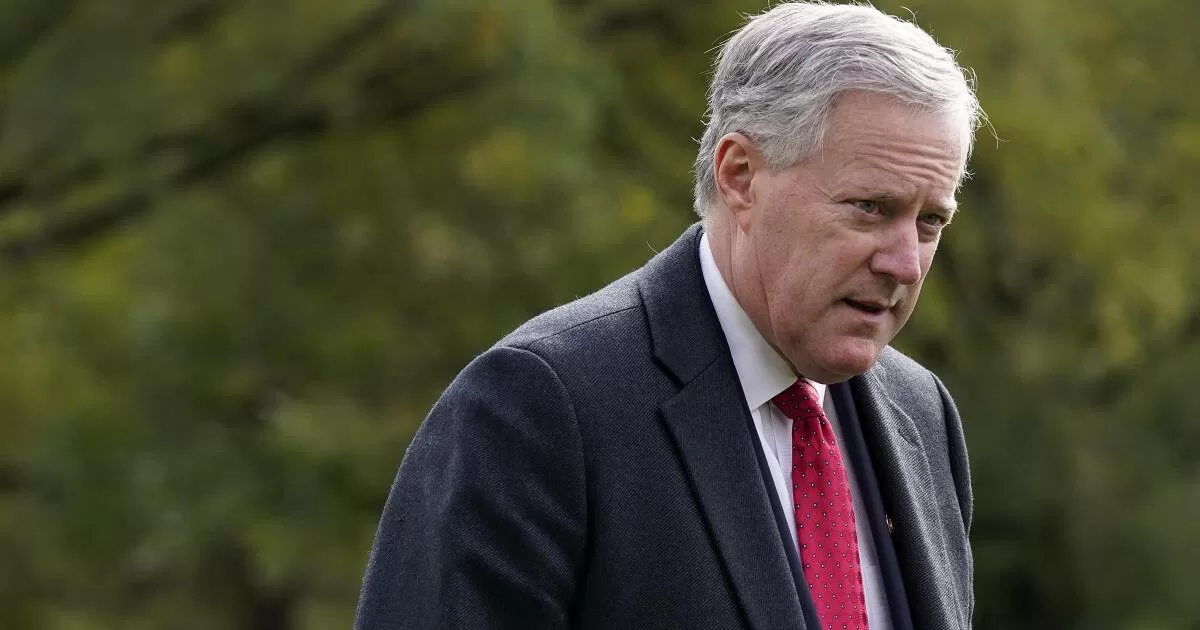The indictment released Wednesday names 11 Republicans who submitted a document to Congress falsely declaring that Trump had beaten Joe Biden in Arizona in the 2020 presidential election. The names of seven other defendants were not immediately released because they had not yet been served with the charges.
The Associated Press has determined the identities of the unnamed defendants based on the indictment’s descriptions of them.
One is described as an attorney “often identified as the Mayor” who spread false allegations of election fraud, a description that clearly describes former New York Mayor Giuliani. Another is described as Trump’s “chief of staff in 2020,” a clear reference to Meadows.
“I will not allow American democracy to be undermined,” Arizona Atty. Gen. Kris Mayes, a Democrat, said in a video released by her office. “It’s too important.”
Eleven people nominated as Arizona’s Republican electors in 2020 met in Phoenix that Dec. 14 to sign a certificate claiming that they were “duly elected and qualified” electors and that Trump had carried the state. A one-minute video of the signing ceremony was posted on social media by the Arizona Republican Party at the time. The document was later sent to Congress and the National Archives, where it was ignored.
Biden won Arizona by more than 10,000 votes. One of the eight lawsuits that unsuccessfully challenged the Democrat’s victory in the state was filed by the 11 Republicans who later signed the certificate declaring Trump the winner.
Their lawsuit asked a judge to decertify the vote counts that showed Biden had won Arizona, and to block the state from sending the results to the electoral college for the nationwide tally. In dismissing the case, U.S. District Judge Diane Humetewa said the 11 Republicans lacked legal standing, waited too long to bring their case and “failed to provide the court with factual support for their extraordinary claims.”
Days after that lawsuit was dismissed, the 11 took part in the certificate signing.
The Arizona charges come after a string of indictments against fake electors in other states.
In December, a Nevada grand jury indicted six Republicans on felony charges of offering a false instrument for filing and uttering a forged instrument in connection with false election certificates. They have pleaded not guilty.
Michigan’s attorney general filed felony charges in July against 16 Republican fake electors on counts that included forgery and conspiracy to commit election forgery. Charges have been dropped against a defendant who reached a cooperation deal, and the remaining 15 have pleaded not guilty.
Three fake electors are among those charged in Georgia alongside Trump and others in a sweeping indictment accusing the defendants of participating in a wide-ranging scheme to illegally overturn the state’s results. They have also pleaded not guilty.
In Wisconsin, 10 Republicans who posed as electors settled a civil lawsuit, admitting their actions were part of an effort to overturn Biden’s victory. There is no known criminal investigation in Wisconsin.
Trump was also indicted in federal court in August over the fake electors scheme. The indictment says that when he was unable to persuade officials in key states to illegally swing the election, he and his Republican allies began recruiting slates of fake electors in battleground states — Arizona, Georgia, Michigan, New Mexico, Nevada, Pennsylvania and Wisconsin — to sign certificates falsely stating he, not Biden, had won the states.
Get the L.A. Times Politics newsletter
Deeply reported insights into legislation, politics and policy from Sacramento, Washington and beyond. In your inbox three times per week.
You may occasionally receive promotional content from the Los Angeles Times.
In early January, New Mexico Atty. Gen. Raúl Torrez said that state’s five Republican electors could not be prosecuted under the current law. Fake electors there and in Pennsylvania had added caveats to their election certificates, saying the submissions were in case they were later recognized as duly elected, qualified electors. No charges have been filed in Pennsylvania.
In Arizona, Mayes’ predecessor, Republican Mark Brnovich, had conducted an investigation into the 2020 election, but the fake elector allegations were not part of that examination, according to Mayes’ office.
In another election-related case brought by Mayes’ office, two Republican officials in a rural Arizona county who delayed canvassing the 2022 general election results face felony charges. A grand jury indicted Cochise County Supervisors Peggy Judd and Tom Crosby in November on one count each of conspiracy and interference with an election officer. Both pleaded not guilty.
Those charged in Arizona on Wednesday include Kelli Ward, former state GOP chair; state Sen. Jake Hoffman; Tyler Bowyer, a Turning Point USA executive who serves on the Republican National Committee; state Sen. Anthony Kern, who was photographed in restricted areas outside the U.S. Capitol during the Jan. 6, 2021, attack and is now a U.S. House candidate; Greg Safsten, former executive director of the state GOP; and energy executive James Lamon, who lost a 2022 U.S. Senate primary.
Also charged are Robert Montgomery, former chair of the Cochise County Republican Committee; Samuel Moorhead, a GOP precinct committee member in Gila County; Nancy Cottle, former vice president of the Arizona Federation of Republican Women; Loraine Pellegrino, president of the Ahwatukee Republican Women; and Michael Ward, a physician who is married to Kelli Ward.
None of the 11 responded Wednesday to Associated Press phone, email or social media requests for comment.
Billeaud and Kelety write for the Associated Press. AP writers Jonathan J. Cooper in Phoenix, Kate Brumback in Atlanta and Marc Levy in Harrisburg, Pa., contributed to this report.
